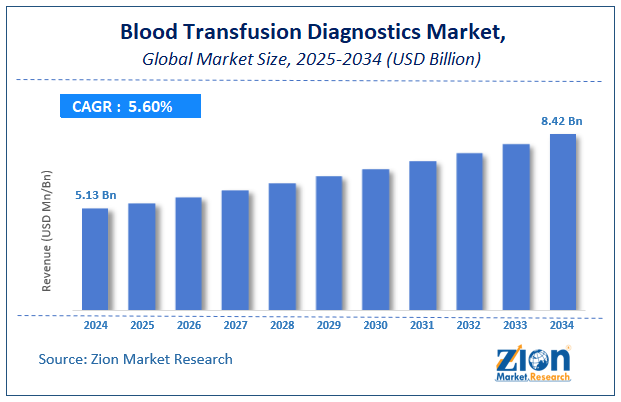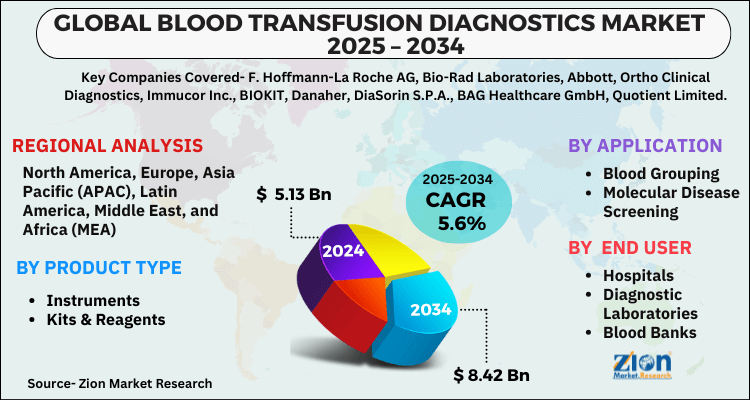Blood Transfusion Diagnostics Market Size, Share, Analysis and Forecast 2034

Blood Transfusion Diagnostics Market By Product Type (Instruments, Kits & Reagents), By Application (Blood Grouping, Molecular Disease Screening), By End-user (Hospitals, Diagnostic Laboratories, Blood Banks), and By Region - Global and Regional Industry Overview, Market Intelligence, Comprehensive Analysis, Historical Data, and Forecasts 2025 - 2034
| Market Size in 2024 | Market Forecast in 2034 | CAGR (in %) | Base Year |
|---|---|---|---|
| USD 5.13 Billion | USD 8.42 Billion | 5.6% | 2024 |
Blood Transfusion Diagnostics Market: Industry Perspective
The global blood transfusion diagnostics market size was worth around USD 5.13 Billion in 2024 and is predicted to grow to around USD 8.42 Billion by 2034 with a compound annual growth rate (CAGR) of roughly 5.6% between 2025 and 2034. The report analyzes the global blood transfusion diagnostics market's drivers, restraints/challenges, and the effect they have on the demands during the projection period. In addition, the report explores emerging opportunities in the blood transfusion diagnostics industry.
Blood Transfusion Diagnostics Market: Overview
The term "blood transfusion diagnostics" refers to tests performed on blood and blood components prior to their transfusion to patients. To avoid adverse reactions or infection transmission, every blood unit should be screened for blood group types and diseases. It's an important aspect of transfusion therapy since it gives healthcare workers important information and ensures the compatibility of recipient and donor blood samples.
Blood transfusion is a process of receiving blood or blood products from one person to another. Blood transfusions are used for various medical conditions such as loss of blood or any other components of the blood. Blood transfusion diagnostics play an important role in blood transfusion in order to avoid infection to both the receiver and donor. In the past decade, molecular diagnostics has grown into a multibillion-dollar industry thanks to the major advancements in biological chemistries and instrumentation. Robust diagnostic techniques are being adopted, allowing the ability to quantitate the data using real-time PCR and other techniques.
Hospitals and diagnostic laboratories are widely using molecular diagnostic techniques in blood transfusion testing and diagnosis. The tenfold growth in demand for diagnostic products and accessories from several end-users in the blood transfusion industry is augmenting the growth of blood transfusion diagnostic market. However, low blood donation rate and stringent regulations related to safe blood transfusion are a few hindrances faced by the global blood transfusion diagnostics market. On the other hand, rapid technological advancement and automation in blood processing equipment, increasing adoption of blood transfusion diagnostics in developing countries, and increasing government awareness programs are expected to offer the future prospects in the forecast period.
Key Insights
- As per the analysis shared by our research analyst, the global blood transfusion diagnostics market is estimated to grow annually at a CAGR of around 5.6% over the forecast period (2025-2034).
- Regarding revenue, the global blood transfusion diagnostics market size was valued at around USD 5.13 Billion in 2024 and is projected to reach USD 8.42 Billion by 2034.
- The blood transfusion diagnostics market is projected to grow at a significant rate due to increasing prevalence of blood-related disorders, the rising demand for safe blood transfusions, and advancements in diagnostic technologies for blood screening and typing.
- Based on Product Type, the Instruments segment is expected to lead the global market.
- On the basis of Application, the Blood Grouping segment is growing at a high rate and will continue to dominate the global market.
- Based on the End-user, the Hospitals segment is projected to swipe the largest market share.
- Based on region, North America is predicted to dominate the global market during the forecast period.
Blood Transfusion Diagnostics Market: Growth Drivers
Growing need for blood transfusion to foster the growth of the market
Blood transfusion demand is being driven by the growing prevalence of infectious and chronic diseases such as severe thrombocytopenia, sickle cell disease, liver disease, kidney disease, hemophilia, cancer, and anemia. According to WHO, anemia was shown to be prevalent in 29.9% of reproductive-age women globally, equating to nearly half a billion females aged 15 to 49. Non-pregnant females of reproductive age had a prevalence of 29.6%, while pregnant women had a prevalence of 36.5 %. In addition to this, the market is being driven by an increase in the number of delivery cases, surgeries, car accidents, and trauma, all of which have resulted in substantial transfusions. Transfusion-transmitted Infections (TTIs) are becoming more common, resulting in a significant demand for donor screening, thereby fueling the market growth.
Blood Transfusion Diagnostics Market: Restraints
High cost associated with the equipment and test to limit the market growth
For the long-term viability of health services that meet quality standards, it is critical to assess the cost and suitability of diagnosis & treatment approaches. Hospitals have evolved into socioeconomic institutions as medical technology has advanced, and they now account for a considerable portion of healthcare costs. The cost of allogeneic blood transfusion varies depending on the application in therapy expenditures. Purchase, treating transfusion-induced responses, monitoring, disposing of it as medical waste, supplying blood components to relevant clinics, testing & preparing the component suitable for transfusion, and submitting all required information imposes an expensive burden. All such factors coupled with the high cost of kits & reagents may impede the growth of the global blood transfusion diagnostics market.
Blood Transfusion Diagnostics Market: Opportunities
Introduction of advanced diagnostics and kits to drive the market during the forecast period.
With the technological advancements in the healthcare domain, there is the introduction of advanced and reliable diagnostics as well as reagents & kits for blood transfusion. Players in the market are focusing on implementing technical breakthroughs in testing techniques. Plasma fractionation is an example of such technological advancement. These factors are estimated to open numerous opportunities for the growth of the market. Also, factors such as growing demand for molecular-based screening of diseases and launch as well as approval of advanced systems have the potential to boost the market during the forecast period.
Blood Transfusion Diagnostics Market: Challenges
The lack of skilled professionals poses a challenge to the market
The prime challenge for the blood transfusion diagnostics market is the lack of skilled professionals to operate advanced equipment & kits used for tests and screening of the blood. In addition to this, strict regulatory bodies and unawareness of blood donations in underdeveloped countries are also some of the factors that pose a challenge to the growth of the market.
Blood Transfusion Diagnostics Market: Report Scope
| Report Attributes | Report Details |
|---|---|
| Report Name | Blood Transfusion Diagnostics Market |
| Market Size in 2024 | USD 5.13 Billion |
| Market Forecast in 2034 | USD 8.42 Billion |
| Growth Rate | CAGR of 5.6% |
| Number of Pages | 205 |
| Key Companies Covered | F. Hoffmann-La Roche AG, Bio-Rad Laboratories, Abbott, Ortho Clinical Diagnostics, Immucor Inc., BIOKIT, Danaher, DiaSorin S.P.A., BAG Healthcare GmbH, Quotient Limited, and others. |
| Segments Covered | By Product Type, By Application, By End-user, and By Region |
| Regions Covered | North America, Europe, Asia Pacific (APAC), Latin America, The Middle East and Africa (MEA) |
| Base Year | 2024 |
| Historical Year | 2020 to 2023 |
| Forecast Year | 2025 - 2034 |
| Customization Scope | Avail customized purchase options to meet your exact research needs. Request For Customization |
Blood Transfusion Diagnostics Market: Segmentation
The global blood transfusion diagnostics market is divided based on product type, application, end-user, and region.
On the basis of product type, the global market is fragmented into kits & reagents, and instruments.
By application, the market is split into molecular disease screening and blood grouping.
Based on the end-user segment, the market is classified into blood banks, diagnostic laboratories, and hospitals.
Recent Developments
- In April 2021, ORTHO VISION Max Swift and ORTHO VISION Swift analyzers were introduced by Ortho Clinical Diagnostics. These analyzers provide laboratory networks with increased processing power and enhanced data security.
Blood Transfusion Diagnostics Market: Regional Landscape
North America to dominate the global market during the upcoming period
Among the regions, North America is estimated to hold the largest share of the global blood transfusion diagnostics market during the forecast period. The region's predominance is attributable to well-established healthcare infrastructure, more public knowledge about blood donations, and better acceptance of the blood transfusion method. According to the National Centre for Biotechnology Information, over 15 million blood units are transfused in the United States each year, and about 85 million units are transfused globally. Due to the wide availability of CE-approved instrument assays for Nucleic Acid Test (NAT) and serological test-based procedures in European countries, the market in Europe is expected to develop at a considerable CAGR. The market in the Asia Pacific is anticipated to grow at a rapid rate during the forecast period.
Blood Transfusion Diagnostics Market: Competitive Landscape
Some of the predominant players that are operating in the global blood transfusion diagnostics market include:
- F. Hoffmann-La Roche AG
- Bio-Rad Laboratories
- Abbott
- Ortho Clinical Diagnostics
- Immucor, Inc.
- BIOKIT
- Danaher
- DiaSorin S.P.A.
- BAG Healthcare GmbH
- Quotient Limited
- among others.
The global blood transfusion diagnostics market is segmented as follows:
By Product Type
- Instruments
- Kits & Reagents
By Application
- Blood Grouping
- Molecular Disease Screening
By End User
- Hospitals
- Diagnostic Laboratories
- Blood Banks
By Region
- North America
- The U.S.
- Canada
- Europe
- France
- The UK
- Spain
- Germany
- Italy
- Rest of Europe
- Asia Pacific
- China
- Japan
- India
- South Korea
- Southeast Asia
- Rest of Asia Pacific
- Latin America
- Brazil
- Mexico
- Rest of Latin America
- Middle East & Africa
- GCC
- South Africa
- Rest of The Middle East & Africa
Table Of Content
Methodology
FrequentlyAsked Questions
The global blood transfusion diagnostics market is expected to grow due to rising awareness of bloodborne diseases, increasing demand for blood transfusions, advancements in diagnostic technologies, and the need for safer and more accurate blood screening methods in healthcare settings.
According to a study, the global blood transfusion diagnostics market size was worth around USD 5.13 Billion in 2024 and is expected to reach USD 8.42 Billion by 2034.
The global blood transfusion diagnostics market is expected to grow at a CAGR of 5.6% during the forecast period.
North America is expected to dominate the blood transfusion diagnostics market over the forecast period.
Leading players in the global blood transfusion diagnostics market include F. Hoffmann-La Roche AG, Bio-Rad Laboratories, Abbott, Ortho Clinical Diagnostics, Immucor Inc., BIOKIT, Danaher, DiaSorin S.P.A., BAG Healthcare GmbH, Quotient Limited, among others.
The report explores crucial aspects of the blood transfusion diagnostics market, including a detailed discussion of existing growth factors and restraints, while also examining future growth opportunities and challenges that impact the market.
RelatedNews
HappyClients
Zion Market Research
Tel: +1 (302) 444-0166
USA/Canada Toll Free No.+1 (855) 465-4651
3rd Floor,
Mrunal Paradise, Opp Maharaja Hotel,
Pimple Gurav, Pune 411061,
Maharashtra, India
Phone No +91 7768 006 007, +91 7768 006 008
US OFFICE NO +1 (302) 444-0166
US/CAN TOLL FREE +1 (855) 465-4651
Email: sales@zionmarketresearch.com
We have secured system to process your transaction.
Our support available to help you 24 hours a day, five days a week.
Monday - Friday: 9AM - 6PM
Saturday - Sunday: Closed






